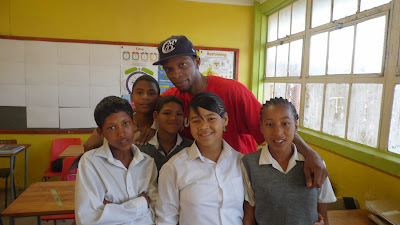
Education in South Africa is a challenge that many South African students face in today's society. There are a number of important factors that need to be addressed if the children who attend schools in South Africa are to succeed and excel in their academic studies. Without the proper resources and opportunities, students' aspirations will begin to dwindle away and goals will become more of a unobtainable dream with no real hopes of achievement. It is an epidemic that seems to have the same theme that plagues our inner city youth in urban communities, particularly among the African community.
The
primary schools in South Africa start typically from grades R-
7th(Kindergarden-7th). "Primary schools" are in general elementary
and middle schools or family schools. Eighth grade marks the beginning of their
high school years. From grades eight to twelve is considered a "secondary
school". The children who attend
these primary and secondary schools are called "learners" instead of
students. Learners attending primary schools begin their ESL program upon
entering 1st grade.
During South's Africa's
apartheid era, the Bantu Education Act of 1953 that was passed in South Africa
stated that Africans who were black were only allowed to study in school only
to a certain point or grade level. Shortly after, funding for religious schools
in South Africa declined under the South African government. This event forced
many schools to close down or become property of the state. The government
spending budget on education for black people suddenly declined. Since there was racial segregation and poor educational opportunities in the black South African community many students protested in the streets of Soweto and were shot at during the 1970s by police during their demonstration. 575 people were shot and killed. When riots began to break out many of the schools were also destroyed.
After years of educational inequality for black Africans in South Africa the president at the time which was P. W. Botha initiated the negotiations between the government and Nelson Mandela, who is the leader of the ANC(African National Congress). Once an agreement was settled between both parties the spending on education by the government increased for black Africans. Years later through consulting between parties the government stated that it will begin to restructure education in South Africa.
 Although
the apartheid era has past not every child in South Africa who is
legally of age is able to attend a primary or secondary school. It is because
of the lack of funding to support the yearly tuition for every child to be able
to go to school. Parents must pay a "school fee" for every child that
will attend school. The school fee is the amount of money that the parents have
to pay to the primary schools and is "aimed at improving the quality of
education of learners." These "school fees" do not include
the fees for registration, administration and other applicable fees.
Although
the apartheid era has past not every child in South Africa who is
legally of age is able to attend a primary or secondary school. It is because
of the lack of funding to support the yearly tuition for every child to be able
to go to school. Parents must pay a "school fee" for every child that
will attend school. The school fee is the amount of money that the parents have
to pay to the primary schools and is "aimed at improving the quality of
education of learners." These "school fees" do not include
the fees for registration, administration and other applicable fees.
The South African Statistical
Association (SASA)made
a statement stating that
the School Governing Bodies (SGBs) of schools have to "supplement
government funding by charging school fees and doing other reasonable forms of
fund-raising." In order for schools to not have to charge any fees
these schools have to be identified as a "no fee school". Every name of a no fee school" is published in a
publication called the Provincial Gazette. For schools to be identified as a
"no fee school" the community that
surrounds the school will be evaluated based on its economic level.
 |
| Terrell with 6th and 7th grade learner at Kalksteen Primary School. |
 |
| Terrell with learners from Zakhele Primary School. |
